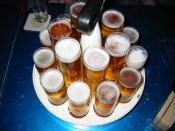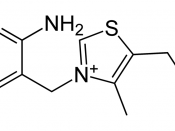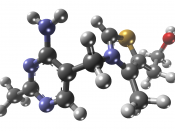Thiamin Deficiency in Alcoholics - SummaryFunction:Thiamin, aka vitamin B1 or aneurin, is essential in the metabolism of carbohydrate and alcohol. Thiamin is part of the coenzyme thiamin pyrophosphate (TPP) which catalyses two reactions of the KrebÃÂs cycle (Dixon, 2007). Dixon (2007) suggests that thiamin has a role outside of the coenzyme duty; there is no concrete proof but it is suspected that thiamin plays a role in nerve function because of the neurological disorders associated with deficiency.
Although in a state of deficiency the kidneys and intestines adapt to increase thiamine uptake (Reidling & Said, 2005); thiamin is poorly available to subjects with liver disease (baker et al , 1975). Baker et al (1975) suggest that malabsorption is linked to the patientsÃÂ inability to dephosphorylate thiaminAlcohol was not shown to be responsible for the malabsorption in a study done on alcoholics that had not been drinking in ~10days, a common theory (Baker et al, 1975).
Sources:Dietary sources of thiamine include pork, fortified cereals and grains, soy milk, legumes and nuts, organ meats and beef (Romanski & McMahon, 1999; Whitney & Rolfes, 2005). The recommended daily allowance for thiamine is 0.5 mg/1,000 kcal (Romanski & McMahon, 1999).
Whitney & Rolfes (2005) state that alcoholics are less likely to eat meals but rather substitute food with alcohol thereby decreasing vitamin intake and increasing their vitamin requirement (vicious cycle). This is outlined in studies by Price, Kerr & Williams (1989) where drinkers, especially beer drinkers, experienced bloating after drinking and found it uncomfortable to eat. The study also revealed that living with others increased the likelihood of eating, thereby decreases an alcoholicÃÂs risk of thiamin deficiency.
Deficiency Disorders:The four disorders outlined in this presentation are WernickeÃÂs Encephaphalopathy (WE), KorsakoffÃÂs psychosis (KP) and the wet and dry forms of beriberi. (Note that because symptoms...


